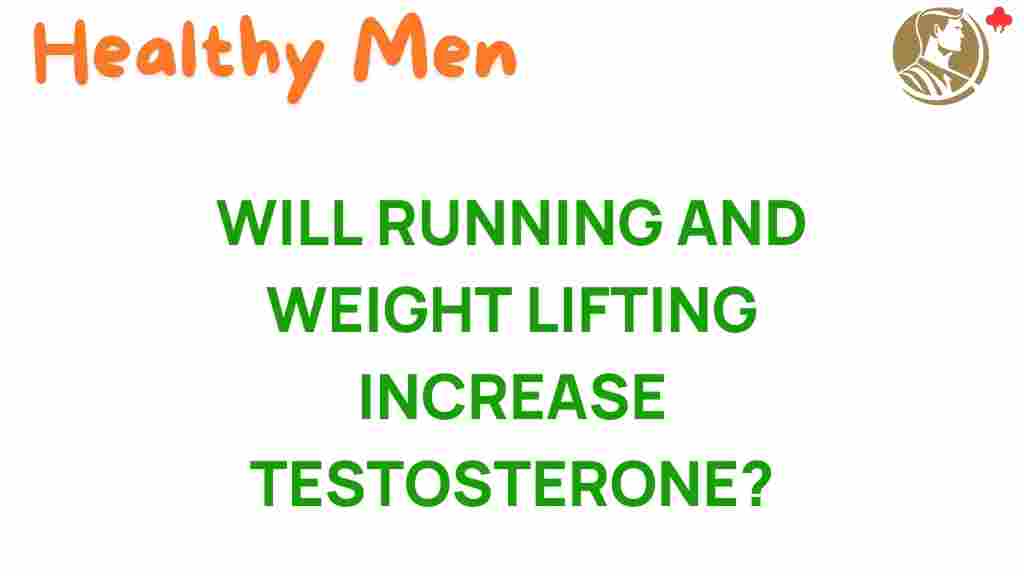Unlocking Testosterone: The Impact of Running and Weight Lifting
Testosterone plays a crucial role in men’s health, influencing everything from muscle growth to mood stability. For those looking to optimize their testosterone levels, understanding how different forms of exercise—such as running and weight lifting—can impact hormone levels is essential. In this article, we will explore the relationship between testosterone, exercise, and overall fitness, providing insights into how you can maximize your health and performance through effective training strategies.
The Role of Testosterone in Fitness and Health
Testosterone is a powerful hormone primarily associated with male sexual characteristics, but it is also important for women. Levels of testosterone can significantly affect:
- Muscle Growth: Higher testosterone levels promote muscle protein synthesis, leading to increased muscle mass.
- Fat Distribution: Testosterone helps regulate fat storage in the body, contributing to a leaner physique.
- Bone Density: Adequate testosterone levels are essential for maintaining strong bones.
- Mood and Energy Levels: Testosterone influences mood and energy, impacting overall motivation and well-being.
Understanding how exercise influences testosterone can help you design an effective fitness regimen that promotes optimal hormonal health.
The Impact of Running on Testosterone Levels
Running is a highly effective cardiovascular exercise that can help improve heart health, endurance, and overall fitness. However, its impact on testosterone levels can be nuanced.
- Short-Distance Running: Studies have shown that short bursts of intense running, like sprinting, can temporarily boost testosterone levels.
- Long-Distance Running: In contrast, excessive long-distance running may lead to a decrease in testosterone levels, especially in men. This phenomenon is often referred to as the “runner’s hormone” effect.
To maximize the benefits of running without negatively affecting testosterone, consider the following:
- Incorporate Interval Training: Use high-intensity interval training (HIIT) to maximize the hormonal response.
- Limit Duration: Keep long runs under 60 minutes to prevent excessive fatigue and hormone depletion.
- Rest and Recovery: Ensure you incorporate adequate rest days to allow your body to recover and maintain hormone balance.
The Benefits of Weight Lifting for Testosterone
Weight lifting is one of the most effective forms of exercise for boosting testosterone levels. Resistance training has been shown to have a significant positive impact on muscle growth and hormone production.
- Compound Movements: Exercises like squats, deadlifts, and bench presses engage multiple muscle groups and are particularly effective for increasing testosterone.
- Intensity Matters: Lifting heavy weights (around 70-85% of your one-rep max) for lower repetitions can stimulate testosterone production.
- Progressive Overload: Continuously challenging your muscles by increasing weights over time can lead to greater hormonal responses.
To optimize weight lifting for testosterone enhancement, follow these guidelines:
- Train Multiple Times a Week: Aim for at least 3-4 days of weight training per week.
- Focus on Full-Body Workouts: Incorporate a mix of upper and lower body exercises for balanced muscle engagement.
- Monitor Recovery: Allow adequate recovery time between sessions to prevent overtraining.
Combining Running and Weight Lifting for Optimal Hormonal Health
The combination of running and weight lifting can provide a holistic approach to fitness and testosterone enhancement. Here’s how to effectively integrate both:
- Schedule Your Workouts: Alternate between running and weight lifting days to give your body time to recover.
- Time Your Sessions: If possible, keep cardio sessions short and intense and do them after weight training to maximize testosterone levels.
- Listen to Your Body: Monitor how your body responds to the combination and adjust workout intensity and volume accordingly.
Nutrition and Lifestyle Factors Affecting Testosterone
In addition to exercise, several lifestyle and dietary factors can influence testosterone levels:
- Diet: A balanced diet rich in healthy fats, lean proteins, and essential vitamins and minerals can support hormone production. Foods like avocados, nuts, eggs, and leafy greens are great choices.
- Sleep: Aim for 7-9 hours of quality sleep per night to promote optimal hormone regulation.
- Stress Management: High stress levels can lead to elevated cortisol, which negatively impacts testosterone. Incorporate stress-reducing practices like meditation or yoga.
Troubleshooting Low Testosterone Levels
If you suspect that your testosterone levels are low despite regular exercise, consider the following troubleshooting tips:
- Consult a Healthcare Professional: If you’re experiencing symptoms like fatigue, mood swings, or decreased libido, seek medical advice.
- Evaluate Your Training: Ensure you’re not overtraining and that you’re allowing sufficient recovery time.
- Check Your Diet: Make sure you’re consuming enough nutrients that support testosterone production.
- Manage Stress Effectively: Incorporate relaxation techniques into your routine to lower cortisol levels.
For further reading on how hormones affect fitness, check out this resource.
Conclusion: The Path to Unlocking Testosterone
Unlocking testosterone through exercise—particularly running and weight lifting—can significantly enhance your overall health, fitness, and performance. By understanding the intricate balance of different types of exercise, nutrition, and lifestyle factors, you can create a personalized approach to optimizing your testosterone levels.
In summary, prioritize a combination of high-intensity running, effective weight lifting, proper nutrition, and healthy lifestyle choices. With dedication and the right strategies, you can unlock the benefits of testosterone, leading to improved muscle growth, enhanced performance, and better overall health.
Remember, achieving hormonal balance is a journey, and being mindful of how you train, eat, and live can pave the way for a healthier and more fulfilling life.
This article is in the category Fitness and created by healthymen Team
